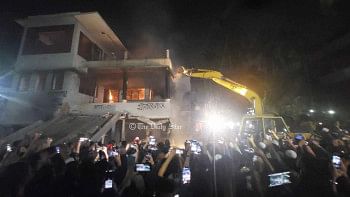Losses by State Jute, Sugar Mills: Mismanagement, graft to blame

Mismanagement, corruption and absence of proper planning are responsible for the losses incurred by the state-owned jute and sugar mills, and workers in no way can be blamed, a group of educationists and researchers said.
They revealed the findings of a research on the recent closures of the jute and sugar mills at a press conference at the Dhaka Reporters Unity yesterday.
They also said the argument that privatisation would lead to the expansion of the industries had no basis.
They argued that about 75 industries in the country were handed over private owners from 1993 to 2010. Thirty-one of them were later found closed. Land and equipment of those industries were either looted or huge bank loans were taken showing the abandoned land.
Prof Mohammad Tanjimuddin Khan and Prof Moshahida Sultana of Dhaka University and researcher Maha Mirza revealed the research findings. The report was prepared following field visits to different jute mills in Khulna and sugar mills in northern districts.
Prof Anu Muhammad, Jyotirmoy Barua, sugarcane farmer Ferdous Imam, and a former jute mills worker, among others, spoke at the press conference, organised by Sarbojonkotha, a journal on politics, economics and society.
The government has recently closed 25 state-owned jute mills due to huge losses incurred in operating them, throwing around 50,000 workers into uncertainty.
The government has also decided to shut down six out of the 15 state-run sugar mills, citing losses as the reason. The six mills employ around 3,000 workers.
While reading out the research findings, Maha Mirza said not only the jute growers, the local economy of the entire Khulna region was linked with the jute mills.
"We see that with the closure of the jute mills, many grocery stores, hotels, furniture and clothing shops and many other small businesses in the industrial area are under threat today," she said.
"The closure of the jute mill does not only mean that around 50,000 workers have turned jobless. It means the destruction of the economy of an entire region."
Presenting the research report on the sugar mills, Moshahida Sultana said, "The rate of sugar extraction from crushing sugarcane is comparatively much lower here -- six to eight percent per tonne -- whereas in India or Brazil, it is 12 to 14 percent. As a result, sugar production is low per tonne in Bangladesh."
From 100kg of sugarcane, India or Brazil can produce 12-14kg of sugar, but in Bangladesh it is almost half. It increases the cost of sugar production in the end, she explained.
Prof Tanjimuddin said, "Losses of mills are considered only through financial calculations. The most important social contributions of the mills at the local level are not recognised. Education, medical care, and housing for the families of state-owned jute and sugar mills workers ensure their human and social development."
Jyotirmoy Barua said, "Section 32 of the labor act clearly states that a worker cannot be evicted from his or her home without paying his or her dues. But we see that the government itself is violating the labor law.
"If the sugar mills had to be closed, then why did the government killed three people at Rangpur sugar mill in 2016 and burnt the houses of two-and-a-half-thousand people? The state has to be held accountable for this."
In his speech, Anu Muhammad said, "When eco-friendly industries are being inspired all over the world, the jute industries with huge potentials are being shut down in Bangladesh through coercion, deception and lies."
Sugar industries are being destroyed paving the ways for importing sugar. It is being done for the interests of the businesspeople, he alleged.
The speakers also placed a seven-point demand that include taking necessary steps to reduce the losses by increasing the production capacity, immediately opening the mills, identification of those involved in irregularities and corruption at the mills and taking legal action against them, and modernisation of the mills equipment.


 For all latest news, follow The Daily Star's Google News channel.
For all latest news, follow The Daily Star's Google News channel. 



Comments